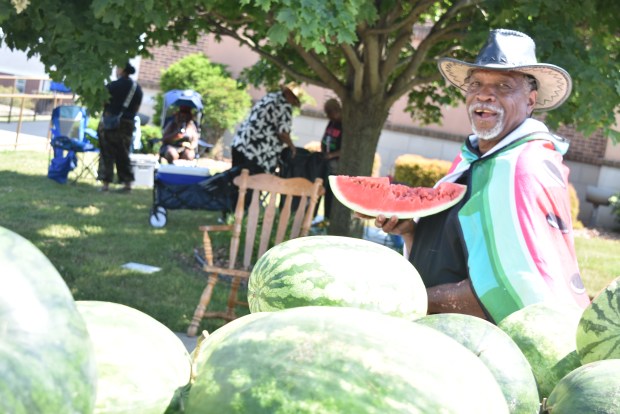Common advice to aspiring fiction writers is to “write what you know.” The idea is that relating something the writer has personally experienced lends authenticity to the narrative while making the author’s task easier.
Long-time Western Springs resident Richard Podkowski took that advice to heart with his 2023 debut novel, “The Walk-On,” a story about the mistakes, pitfalls, and ultimate redemption of Mike “The Steel Man” Stalowski, a working-class kid and star football player from the Southeast Side of Chicago.
“The Steel Man is a neighborhood kid, a blue-collar kid,” he said in a recent telephone interview, “and Mike is a very troubled man.”
Podkowski sets Stalowski’s childhood in the Hegewisch neighborhood, and he draws on his own experiences growing up on the South Side to lend authenticity to the narrative.
Podkowski himself is the son of Polish immigrants who came to the United States after the carnage of the Second World War, which left his father wounded during service as an officer in the Polish Army, and his mother spending time in a prison work camp.
Coming to America, his parents first settled near 52nd Street and Ada Avenue, where he spent his early years before the family moved near Midway Airport.
Podkowski said his background was a definite influence on how he shaped his protagonist.
“The Steel Man and I share the same DNA,” he said. “Some people said I am Mike Stalowski, and I did draw on some of my life experiences. I know the South Side, and I know the city.”
Podkowski graduated from Brother Rice High School and Loyola University, where one of his professors, who happened to be retired from the Chicago Police Department, had a son on the Secret Service, which led to him joining the service during the first Reagan administration.
He retired after 20 years with the Secret Service, much of it spent in Washington D.C., where he guarded the Reagans in their final year in office, then the first Bush administration.
“I retired as a supervisor of what we called the organized crime task force in the Chicago Field Office,” he said.
That position dealt mainly with financial fraud and identity theft but often meant working against organized crime, foreign and domestic.
After retiring, Podkowski worked in the private sector for Fortune 500 companies, while managing his detective agency, and spent a couple of years working security for the NFL. It was during his time with NFL security that he absorbed experiences that brought credibility and humanity to the Steel Man’s struggles.
“I gained a fair amount of insight when the manuscript was written, and it helped me go back and make edits,” he said of shaping the Stalowski character.
Stalowski’s father suffers a stroke early in life, resulting in him being bitter about the time he had to spend caring for him instead of being out with his friends.
“He’s got anger management issues, and he’s sort of an introvert, partly by choice, but also by circumstances,” Podkowski said.
Stalowski, a natural athlete, becomes a star middle linebacker at the University of Illinois and later plays for the mythical Chicago Storm.
In the twilight of his career, his body breaking down from the physical trauma of an NFL career, Stalowski becomes dependent on alcohol and drugs to keep playing at the level everyone expects. His marriage falls apart, he makes a bad call that costs the Storm the championship game, and he begins a downward spiral that ends with the alcohol-related death of his new love.
Podkowski said the narrative was suggested, in part, by the real-life problems of high-profile NFL players of the era — circa 2007 — which happened to coincide with the time he was coaching his son in youth football in Western Springs.
“A lot of NFL football players were getting in trouble for one reason or another,” he said. “Domestic violence, Michael Vick got in trouble for dogfighting. Some drugs, drinking, and just the pitfalls that people fall into.”
But Podkowski cautioned against thinking of “The Walk-On” as just another generic sports story.
“It’s not a football story,” he said. “Yes, it’s about a football player, but I think the universal theme of personal redemption and the struggles that he went through could be assigned to any profession or career, or anybody.”
Another theme Podkowski explores in his story is the interaction between media and professional athletes, where an athlete can be a hero to the community one day, only to fall from grace the next.
“When you’re a hero, you’re a hero,” he said. “When you’re not a hero, you’re now an object of vilification.”
Podkowski said that he considered writing fiction as far back as his college days, but put those thoughts aside while concentrating on his career and raising a family.
He talked about living in Western Springs where he and his wife Patty — his first editor — raised a son and daughter together.
“I was very active in Western Springs,” Podkowski said. “I coached Little League, and I coached youth football. We enjoyed our time there, we had a lot of friends there, and actually we miss it very much.”
Both of his children graduated from St. Ignatius College Prep, and both attended Southern California University. His son is now a Los Angeles Police officer; his daughter works for Occidental College.
The Podkowskis now live in Pasadena, not far from the Rose Bowl, where their regular walking routine often takes them.
While he may be retired, he is far from inactive.
“The Walk-On” has been honored by several writing awards, including Best Book Winter 2024 from the Pencraft Awards, a finalist in the American Writing Awards, a finalist in Indies Today, and a Readers Favorite Award.
“The Walk On” has also received several positive reviews, among them from the Kirkus Reviews, several fellow authors, and former Chicago Bear star, Gary Fencik.
With “The Walk-On” published and possible television or movie projects being considered, Podkowski also recently finished a romantic comedy, “Operation Santa Bear,” a screenplay—from his original book manuscript—that actually has its ending near Richmond Park in Western Springs, and is now in the editing process.
And he’s putting his experience fighting organized crime to good use for his next project, “Second Cities,” stories about international and domestic crime cartels.
Podkowsky also dabbles in acting.
“I started out as an extra on Chicago Fire and Chicago PD,” he said, noting that he’s been taking acting classes and done some commercials.
For further information on Richard Podkowski and his work, visit his web page richardpodkowski.com.
Hank Beckman is a freelance reporter for Pioneer Press.




